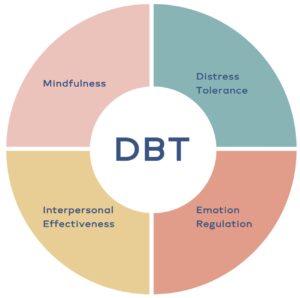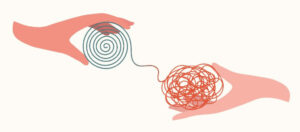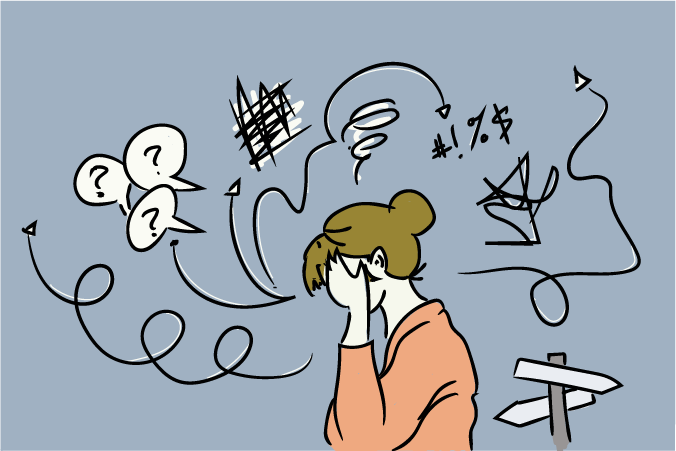If you are struggling with anxiety, you are not alone. Anxiety disorders are the most common mental health disorder in the United States. However, there is good news: there are treatments that can help. One of those treatments is dialectical behavior therapy or DBT. In this blog post, we will discuss what DBT is and how it can help you cope with anxiety.
Contents
What Is DBT?
 DBT, or Dialectical Behavioral Therapy, is a type of therapeutic approach that focuses on helping individuals develop healthier coping skills. And better ways of handling life’s challenges. It combines cognitive-behavioral techniques with mindfulness, acceptance, and validation to create an effective way to manage emotions and reduce stress.
DBT, or Dialectical Behavioral Therapy, is a type of therapeutic approach that focuses on helping individuals develop healthier coping skills. And better ways of handling life’s challenges. It combines cognitive-behavioral techniques with mindfulness, acceptance, and validation to create an effective way to manage emotions and reduce stress.
The goal is to help clients recognize their patterns of behavior and find healthier ways to cope with life’s difficulties. Within DBT, clients are taught to recognize their personal strengths and weaknesses and use them to build personal resilience. They learn how to take action in order to change negative behaviors and thought patterns.
DBT has been used successfully in the treatment of a variety of mental health issues, including anxiety, depression, substance abuse, eating disorders, anger management, and suicidal ideation.
Is CBT Or DBT Better For Anxiety?
Anxiety is a common mental health concern, and it can often be treated with either Cognitive Behavioral Therapy (CBT) or Dialectical Behavior Therapy (DBT). Both approaches have been found to be effective in treating anxiety, but there are some subtle differences between them.
CBT is a more structured form of therapy that focuses on the relationship between thoughts, feelings, and behaviors. It works to identify patterns in thinking that lead to anxiety-inducing behavior and offers strategies for changing these thought patterns.
DBT, on the other hand, takes a broader approach to treating anxiety. It works to help individuals learn how to better regulate their emotions and view situations from a different perspective. DBT also encourages behaviors that aid in reducing stress and developing healthy coping skills.
In terms of which approach is better for anxiety, it really depends on the individual and their needs. Both CBT and DBT are evidence-based therapies that have been shown to be effective in treating anxiety. Ultimately, the best way to determine is to speak with a mental health professional who can assess your individual needs and make recommendations.
What Techniques Are Involved In DBT For Anxiety?
Now, if you have opted for DBT for anxiety, then you might be wondering what techniques are involved in the process. Some of the most common ones are:
- Mindfulness: This involves being aware of your thoughts, feelings, and behaviors in the present moment without judging them. It helps to reduce stress and increase self-awareness.
- Dialectical Thinking: This involves learning how to accept both sides of a conflict or situation so that you can make better decisions. It helps to give you the ability to see the bigger picture in order to take more effective action.
- Distress Tolerance: This involves learning how to accept and manage difficult emotions without trying to make them go away. It teaches you to tolerate distress in order to move forward.
- Emotion Regulation: This involves being able to identify, understand, and regulate your emotions so that they don’t become overwhelming. It helps to improve your mental health and increase your quality of life.
Overall, DBT for anxiety is an effective approach that can help you understand your emotions better and learn how to manage them more effectively. It’s important to remember that this type of therapy isn’t a cure-all. But it can make a significant difference in the way you feel and the way you cope with anxious feelings. It’s important to find a therapist who is experienced in DBT so that you can get the best possible results.
What Benefits You Can Expect?
If you are considering DBT for anxiety, then you can expect to gain several benefits. Here are a few of the biggest benefits of DBT:
1. Improved emotional regulation: Developing healthy coping strategies and learning how to regulate your emotions can help you better manage stress, anxiety, and other difficult emotions.
2. Better communication skills: Through DBT, you will learn how to effectively communicate with others and express yourself in a constructive way. This can help you build better relationships and reduce interpersonal conflicts.
3. Improved self-esteem: DBT helps you to become more mindful of your thoughts and actions, allowing you to recognize the strengths and qualities that make you unique. As your self-esteem increases, so too will your ability to successfully cope with life’s challenges.
4. Increased inner peace: It teaches you to accept yourself and your circumstances for what they are and practice mindful living. This can help you find greater peace of mind, joy, and contentment in life and allow you to experience greater well-being overall.
5. Deeper insight into your emotions: Through regular self-reflection and exploration of your inner world, DBT can help you gain a deeper understanding of how your thoughts and feelings influence each other. This insight can give you greater control over your emotions and be an invaluable tool for managing anxiety.
These are just some of the many benefits that DBT can offer for those struggling with anxiety. By taking a proactive approach to managing your mental health, you can learn how to build healthier habits and live a more fulfilling life. With the right help and support, DBT can provide an invaluable tool in your journey toward improved mental well-being and greater happiness.
When DBT Should Not Be Used?
Generally, DBT for anxiety is considered but there are some cases where it may not be recommended. For instance, if the person has severe mental health issues like schizophrenia or bipolar disorder. Then, they may not benefit from DBT as much as someone with just anxiety.
Also, people who have a history of substance abuse are not always suitable for this type of treatment since it can trigger cravings. Additionally, those with suicidal tendencies should look into more intensive forms of treatment. Lastly, patients who do not have the time or motivation to participate in regular therapy sessions may find DBT ineffective.
So you can see that not everyone is an ideal candidate for DBT. It’s important to consult with a professional mental health provider to determine if this type of therapy is right for you. Only then you can reap the full benefits of the therapy.
Therefore, it’s important to consider all these factors before deciding whether or not DBT is right for you. With the right help and support, however, this type of therapy can be a great way to manage anxiety.
How Long Does It Take For DBT To Work?
When you are going further with DBT therapy for anxiety or other mental health issues, it will take some time for you to see the results. It is important to remember that DBT therapy takes a long-term approach and is not meant to be a quick-fix solution.
It may take several months or longer of consistent practice for a person to start noticing changes in their habits, emotions, and overall well-being. Because each person’s experience with DBT will be different, there is no set time frame for results. The most important thing to remember when starting a course of DBT therapy is to be consistent and patient as you work through the treatment process.
Can I Do DBT Therapy For Anxiety On My Own?
 The short answer is no. Dialectical Behavioral Therapy (DBT) is a complex and structured form of treatment that requires professional guidance and support from a trained therapist. Doing DBT therapy on your own is not recommended. Because it can be difficult to follow the required steps without the help of an experienced therapist.
The short answer is no. Dialectical Behavioral Therapy (DBT) is a complex and structured form of treatment that requires professional guidance and support from a trained therapist. Doing DBT therapy on your own is not recommended. Because it can be difficult to follow the required steps without the help of an experienced therapist.
Additionally, it’s important to get personalized feedback on how well you are progressing in treatment. So that any adjustments can be made if necessary. It is also important to have a supportive environment in which to practice new skills.
As this is an integral part of the therapeutic process. A trained therapist can provide these resources and support that you may not be able to find on your own. DBT can be very effective for treating anxiety and other mental health conditions when done with a qualified professional.
Conclusion
In conclusion, DBT for anxiety has been shown to be a beneficial form of therapy that can help people struggling with anxiety disorders in many ways. It has been shown to reduce symptoms and improve overall functioning. As well as provide tools for managing stress and other difficult emotions. Additionally, DBT provides support and structure while also being flexible enough to meet the individual needs of each patient.
For more information, please contact MantraCare. Anxiety is a feeling of fear, worry, and unease often related to an upcoming event or uncertain outcome. If you have any queries regarding Online Anxiety Counseling experienced therapists at MantraCare can help: Book a trial Anxiety therapy session


